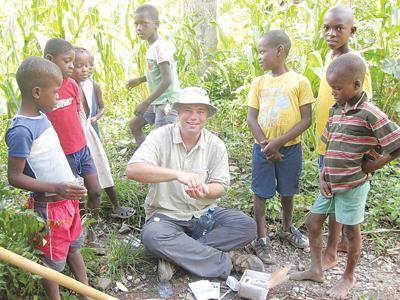Burning trash piles, fully uniformed United Nations soldiers holding machine guns and high levels of air pollution welcomed LSU AgCenter assistant professor David Weindorf on his recent trip to Haiti.Weindorf stayed in the Caribbean country with John Kruse, research agronomist with Georgia-Pacific in Decatur, Ga., from Aug. 10 to 14. The two men went at the request of North and South Carolina churches who have had a mission in Haiti for 15 years. The churches made a call for agronomists to help the farmers of Haiti through the Soil Science Society of America, a professional organization founded in 1936 whose stated mission is to advance the field of soil science. Agronomists specialize in plant and soil science including physical and chemical characteristics of soils, Weindorf explained. He said he volunteered for the trip because he felt it would be a rewarding experience. He said he personally bought his ticket to Haiti, and the church provided his accommodations and meals while on the expedition. Weindorf said he’s appreciative of the training he’s received and feels responsible to share it. “I want to get information to people who need it — whether in Opelousas or halfway around the world,” he said. Bayonnais, the area where Weindorf and Kruse focused their efforts, is home to nearly 80,000 people. Residents have no electricity, and the only water available runs down the mountain through open-air aqueducts, he said.People use the aqueducts for bathing, cooking and drinking water, though the men drank bottled water while they were there, Weindorf said. Through rudimentary soil testing, Weindorf said they were able to identify the main deficiencies in the soil, including a low amount of phosphorus. The amounts were so low that the corn had a purplish tint, he said.Weindorf and Kruse determined pig manure was high in phosphorus and demonstrated compost creation, the use of animal manure and food waste to create a natural fertilizer, to the Haitian people. The people seemed to appreciate the information the men had to offer, Weindorf said.”They gave us everything they had and more,” he said.Since the trip, the AgCenter has extended an invitation for three Haitian agronomists to train at the University in November, but they will have to acquire the proper visas to come to the U.S. During the 18th century, Haiti was one of the wealthiest colonies in the Caribbean with an economy based on forestry, sugar-related industries and the heavy importation of slaves. In 1804, the country became the first black republic to declare independence. But it has been plagued by political unrest for most of its history. Haiti’s first democratically elected president was inaugurated in May 2006, according to the CIA World Factbook. United Nation forces have been present in the country since June 2004 as part of the United Nations Stabilization Mission in Haiti. The mission aims to restore stability, promote the political process, strengthen Haiti’s government and protect human rights.Linda Benedict, associate communications director for the AgCenter, said in an e-mail she’s not aware of any similar trips in which the University has participated.————Contact Olga Kourilova at okourilova@lsureveille.com
Professor helps Haitian farmers
September 11, 2009




